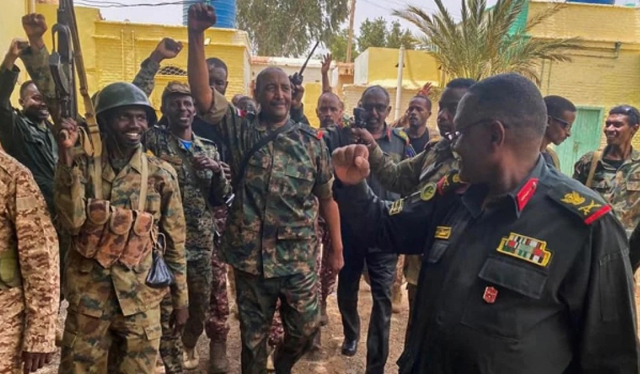
KHARTOUM, June 1 (NNN-AGENCIES) — Sudanese army forces blasted paramilitary bases with artillery in Khartoum on Wednesday after pulling out of US and Saudi-brokered ceasefire talks, accusing their foes of failing to honour their commitments.
Mediators have blamed both sides for violating the truce which was supposed to enable secure corridors for delivering aid to an increasingly needy population.
In both the north and south of the capital, key bases of commander Mohamed Hamdan Daglo’s Rapid Support Forces came under attack by troops loyal to army chief Abdel Fattah al-Burhan, residents said.
One witness said there was “heavy artillery fire from army camps” in northern Khartoum, on the 47th day of a war that researchers said has claimed 1,800 lives.
Another reported “artillery blasts on the RSF camp in al-Salha” in southern Khartoum — the largest paramilitary base and arsenal in the city.
The attacks came two days after United States and Saudi mediators said the warring parties had agreed to extend by five days the initial week-long humanitarian truce.
The mediators of the talks, held in the Saudi city of Jeddah, acknowledged repeated breaches but have held off imposing any sanctions.
The army walked out “because the rebels have never implemented a single one of the provisions of a short-term ceasefire which required their withdrawal from hospitals and residential buildings”, a Sudanese government official said on condition of anonymity because he was not authorised to speak to the press.
Mediators admitted the truce had been “imperfectly observed”, but said the extension would “permit further humanitarian efforts”.
Despite repeated pledges from both sides, fighting has flared this week both in greater Khartoum and in the western region of Darfur.
“The army is ready to fight until victory,” Burhan declared during a visit to troops in the capital.
The RSF, led by Burhan’s deputy-turned-foe Daglo, said they would “exercise their right to defend themselves” and accused the army of violating the truce.
On Sunday the mediators said both forces had disrupted humanitarian efforts, including through the presence of snipers near hospitals in RSF-controlled territory, and army “elements” stealing medical supplies.
They said RSF occupied “civilian homes, private businesses, and public buildings”, some of which were looted, while Burhan’s forces flew military aircraft daily during the ceasefire, “including a confirmed airstrike” that reportedly killed two people.
African Union spokesman Mohamed El Hacen Lebatt said that suspension of the talks should “not discourage” mediation efforts.
United Nations Secretary-General Antonio Guterres on Wednesday reiterated his support for the body’s envoy to Sudan, Volker Perthes, after Burhan called for his dismissal.
“It is up to the Security Council to decide whether the Security Council supports the continuation of the Mission for another period or whether the Security Council decides that it is time to end it,” he added.
After a meeting with East African bloc IGAD, and other officials, he said a plan for broad talks among all Sudanese would be proposed as soon as possible.
The UN says 1.2 million people have been internally displaced and more than 425,000 have fled to neighbouring countries.
More than half the population — 25 million people — are now in need of aid and protection, the UN says.
Entire districts of Khartoum no longer have running water, electricity is only available for a few hours a week, and three quarters of hospitals in combat zones are not functioning.
The health ministry said Wednesday that “nine health facilities” had gone out of service in Jazira state, just south of Khartoum, “despite the declared truce”.
It blamed “the presence of RSF militias threatening the movement of medical personnel and supplies”.
Hundreds have been killed in Darfur, on Sudan’s western border with Chad, where continued fighting “blatantly disregards ceasefire commitments”, Toby Harward, of the UN refugee agency, said earlier.
Darfur has never recovered from the years-long war that began in 2003 when a rebel uprising led strongman Omar al-Bashir to unleash the Janjaweed militia, from which the RSF are descended. — NNN-AGENCIES
